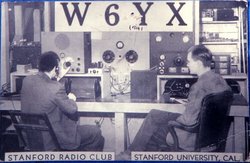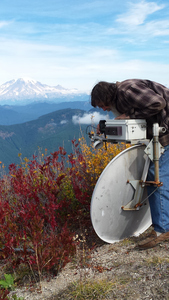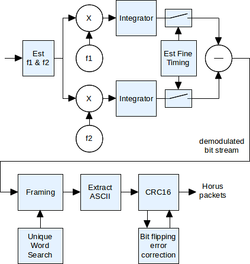 October 21, 2015 Editor: Paul Bourque, N1SFE | ||||
IN THIS ISSUE
NEW HF OPERATORS - THINGS TO DO The CQWW SSB contest is the "major" this time. It's a great way to work some DX contacts, and fill in some DXCC countries on various bands. You can do the 48-hour contest solo, but it can be even more fun if you're part of a multi-op. BULLETINS
"ARRL Sweepstakes time is almost here - will you be ready? This year, there are two weeks between CQWW-Phone weekend and the CW Sweepstakes (November 7 & 8) so you have a whole extra week to make preparations! One of your first stops should be to check out the 2015 Operating Guide (PDF) and other important info on the ARRL November Sweepstakes web page. Next, spend some time with the updated ARRL Sweepstakes Records for both modes. Some records at the Division and Section level have never had any entrants for many classes, and other existing records could easily be within your grasp. Affiliated Club competition continues to be a very popular aspect of Sweepstakes each year. If your club hasn't already started making plans to get more members on the air for Sweepstakes, take the initiative to start 'talking up' SS. Encourage ops in your group to get on and make some contacts, even if it can't be a full-time effort. Remind them that the Clean Sweep mug (for working all 83 ARRL/RAC sections) is available again this year, as are Participation Pins for anyone who completes more than 100 contacts on CW or Phone during Sweepstakes. More activity means more fun for everyone!" -Larry Hammel K5OT, ARRL Sweepstakes contest manager If you enjoyed the ARRL Centennial operating activities, you'll likely flip over the upcoming National Parks on the Air event, which starts January 1, 2016. The year 2016 is the 100th anniversary of the National Parks Service. If you like operating outside, setting up field-day style operations, you can activate National Parks, National Battlefields, Historic Sites, Memorials, Preserves, Reserves, Rivers, Seashores, National Scenic Trails, and the like. You'll be "chased" by those working you, and all scores will be reflected in an on-line NPOTA leader board based on the LotW data. Examining the list of qualifying locations, I'm betting there will be some that will be extremely rare due to access, size, and/or appropriateness. BUSTED QSOS Bill, AC0W writes: "Well I see contest sponsors have taken the log due dates to the extreme. Phone Fray Oct 14 and Oct 21 have log due date of Oct 9. Talk about needing to use ESP to generate your log before the contest even occurs." CONTEST SUMMARY Complete information for all contests follows the Conversation section October 22 October 23 October 24 October 28 October 29 October 30 October 31 November 1 November 3 November 4 The U.S. Department of Transportation is moving in the direction of requiring Unmanned Aircraft System (Drone) registration. While consideration is being given to recognizing that there are smaller 'toy' vehicles that would be exempt, many of the great videos we've seen on the Internet were taken by craft that would likely require registration under the registration process. TV antennas are making a comeback as more and more people are discovering that digital over-the-air broadcasts can look great, and don't require a monthly fee. Though shortwave broadcasts have been declining, EU Longwave broadcasts (148.5 - 253 kHz) appear to have a steady audience.(Thanks N6KI) What were the most disruptive technologies of the 20th century? Things like TVs, CDs, DVDs, Computers, may come to mind... however some argue that it was the general availability of home appliances . N3FJP logging program assortment now supports the CQWW DX RTTY Contest. Two hundred and nineteen miles is the current record for the distance traveled by a single piece of tornado-carried debris. Researchers used social media to research and track items carried by a single storm in 2011 . An enthusiast has used off-the-shelf parts, and a 3D printer, to build a hand-held railgun capable of launching projectiles at 560 MPH. The article includes links to video of it in action. The gentleman built this in his basement. (Thanks W7SNH) WORD TO THE WISE QLF - used in CW communications, meaning "I am sending with my left foot." To use the interrogative form, follow with a question mark: QLF? Translation: "Are you sending with your left foot?" Most often heard around the beginning of a new calendar year, coincident with SKN.
The results for the 2015 Topband Summer Stew are now available, as are the preliminary results of the "Pre-stew" held last weekend. - N6TR "The 2015 Salmon Run Results are posted on the WWDXC Website. Thanks to Mike N7WA for doing the scoring, slicing and dicing of nearly 300 logs received and presenting the data in a readable format. Many logs (including about 10 paper logs) needed fixing up before entering the analysis program - Mike and Jim K7WA accomplished that. Also, we need to thank Dick K7BTW for managing the County Activity page before the Salmon Run, and Matt KQ7W and Mike K7SR who are working on the Participant Awards (pdf certificates), Kirk N7UK and Dennis K7DSE the Awards guys, the WWDXC Board and all members for your support!" - K7WA OPERATING TIP Four little reminders prompted by operating in the CQWW RTTY Contest last month: · If you're S&Ping, you generally don't need to send the CQing station's callsign. · On RTTY, send 599, not 5NN. 599 sends the character 5, then 9, then 9 - three characters in total. Sending 5NN sends the character 5, then the non-printing LTR character, then N, then N - four characters in total. · Don't send ANY canned information from any database, like the other stations name. Yes, it's cool that you can do that. Refrain. Just send the contest exchange. Besides, it's a little awkward when the name in the database is "Roberto" but the operator is known by everyone as "Bob." · There's no need to send 599 twice in the exchange. If you're looking for a new 160m receive antenna for a space constrained location, perhaps you should give the DHDL antenna a look. Developed for the TX3A DXpedition, it's a Double Helix Delta Loop, and boasts an RDF improvement of 2.5 dB over a single flag antenna of similar dimension. DH1TW tried this antenna at ED1R, and reported his favorable results. (WWDXC reflector) Quantum computers will use a different architecture, and work with different concepts than computing until now. We'll have to think about how to frame problems in a different way, using new computer languages suited to the new models. Recently, a new distance record for 'Quantum Teleportation' was set. Single entangled photons were transmitted and detected across 100km of fiber. This record was a result of a refinement of the detector capability. (Thanks N6KI) Sometimes all it takes is one project to instill a life-long interest in building electronic projects - here's a headphone amplifier that could be that project. It's a relatively simple design, with parts and resources available from numerous sources. Memristors are shipping ! These devices can be "programmed" with a current to exhibit a particular resistance when subsequently read with a (smaller) current. It is thought that they'll be able to spur the creation of new types of non-volatile storage. One currently available device has eight memristors in one single package. SMD parts are usually small, requiring tools to handle. An inexpensive suction-type tool for picking and placing parts is available from Electronics Goldmine which could be just the thing you need for parts that are too 'slippery' for tweezers.(QRP-L mailing list)
http://www.hamsource.com/ezmeter.html " - (Thanks K9YC)
Technical Web Site of the Week - Building an FSK Decoder using open source tools for use in high-altitude balloon telemetry. Written by David Rowe, VK5DGR, author of FreeDV, this is a great blog post illustrating how a design for a software modem was developed using open source software, tested, and deployed against real-world signals. Some interesting findings include that using reasonable hardware, performance was adequate using GNU Octave, without compiling the design further, to decode real-world signals, and that a real-world driver must be able to accommodate variation in the sender's clock rate. Perhaps this article will spur others to do their own RTTY decoder design and experimentation. Multi-Single Many of the major contests have some sort of multi-single category. At first glance, one might think that this means that multiple operators can take turns operating a single radio. At some level, it is that. However, individual contests have different variations and special rules for "Multi-single" operation. For the CQWW contest, one radio is used for the "run", but a second radio may be simultaneously used as long as the station worked is a multiplier. No CQs may be sent on the 'multiplier' radio, and there are band change restrictions. For the CQWW 160 contest, if you use spots, you're a multi. The ARRL Sweepstakes has one Multi-operator category, and it only allows one transmitted signal at a time. To earn a big score, one must follow the rules, but must also think creatively about how to get a higher rate or more multipliers. For example, for ARRL Sweepstakes, only one transmitted signal is allowed. There are no restrictions on band changes. The top-scoring multi-ops use more than one operating position, with the transceivers coordinated using a 'lock-out' so that only one is transmitting at a time. In this fashion, slightly lower rates are obtained on each station, but in aggregate the rate is excellent. Listening to an "M" station running on a band in sweepstakes, one might hear serial numbers being skipped as the 'other' station hands them out to their contacts. For Sweepstakes, just having the radios lockout-coordinated is no guarantee of a high score - the exchange is long, and all operators must remain sensitive to the possibility that another operator is waiting to complete a Q. Add some band noise necessitating repeats, and frustrations can occur. As with any other contesting skill, practice can make you better, and the best practice for Sweepstakes is... Sweepstakes. Over time, as operators develop an awareness of where their team members are in their Q's, the rate can increase as exchanges are coordinated. For some ideas on lockout devices, check this information provided for the CQWW (scroll down to Hardware Lockout Devices), as well as the 4O3A Lock-X device. Some of the contest logging programs can now coordinate PTT and keying through the LAN to provide a lockout function - but some stories indicate that caution is warranted to absolutely test that software and hardware has been set up correctly, and that it's not possible to have more than one signal on the air. "Works most of the time" is not good enough here, and it would be disappointing to find out after a weekend of contesting that you had to enter a checklog because of a lockout malfunction. 73, Brian N9ADG An expanded, downloadable version of QST's Contest Corral in PDF format is available. Check the sponsor's Web site for information on operating time restrictions and other instructions. HF CONTESTS CWops Mini-CWT Test , Oct 21, 1300z to Oct 21, 1400z, Oct 21, 1900z to Oct 21, 2000z, Oct 22, 0300z to Oct 22, 0400z; CW; Bands: 160, 80, 40, 20, 15, 10m; Member: Name + Member No., non-Member: Name + (state/province/country); Logs due: October 24. VHF+ CONTESTS ARRL EME Contest , Oct 31, 0000z to Nov 1, 2359z; CW, Phone, Digital; Bands: 50-1296 MHz; Signal report; Logs due: January 1. LOG DUE DATES October 23, 2015 October 24, 2015 October 25, 2015 October 30, 2015 October 31, 2015 November 1, 2015 November 2, 2015 ARRL Information Click here to advertise in this newsletter, space subject to availability. Your One-Stop Resource for Amateur Radio News and Information ARRL membership includes QST, Amateur Radio's most popular and informative journal, delivered to your mailbox each month. Subscribe to NCJ - the National Contest Journal. Published bimonthly, features articles by top contesters, letters, hints, statistics, scores, NA Sprint and QSO Parties. Subscribe to QEX - A Forum for Communications Experimenters. Published bimonthly, features technical articles, construction projects, columns and other items of interest to radio amateurs and communications professionals. Free of charge to ARRL members: Subscribe to The ARRL Letter (weekly digest of news and information), the ARES E-Letter (monthly public service and emergency communications news), Division and Section news -- and much more! ARRL offers a wide array of products to enhance your enjoyment of Amateur Radio. Visit the site often for new publications, specials and sales. Donate to the fund of your choice -- support programs not funded by member dues! Reprint permission can be obtained by sending email to permission@arrl.org with a description of the material and the reprint publication. ACKNOWLEDGEMENTS ARRL Contest Update wishes to acknowledge information from WA7BNM's Contest Calendar and SM3CER's Contest Calendar. | ||||









